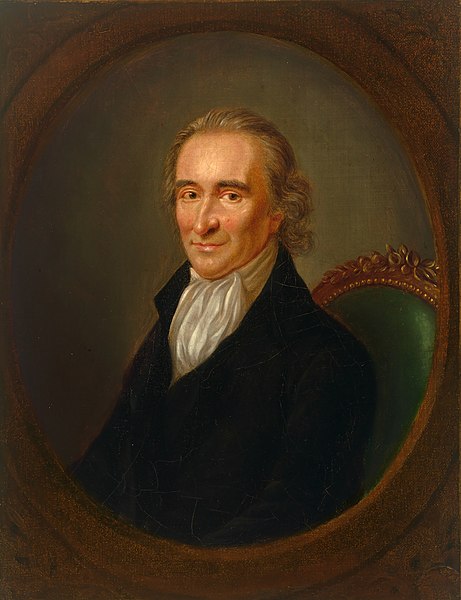Thomas Paine (1737-1809) was a prominent intellectual, writer, and revolutionary figure during the late 18th century.
Born in England, Paine’s groundbreaking pamphlet “Common Sense” played a pivotal role in inspiring American independence from British rule.
His ideas on liberty, democracy, and individual rights had a profound impact on the American and French Revolutions, making him a key figure in the era of Enlightenment.
Despite facing challenges and controversy later in life, Thomas Paine’s enduring legacy continues to influence political thought and social movements to this day.
Thomas Paine Facts
1. Born on January 29, 1737, in Thetford, England
Thomas Paine was born to Joseph Paine, a Quaker corset maker, and Frances Cocke, in the small town of Thetford, Norfolk, England.
Also Read: Timeline of Thomas Paine
He had a relatively humble upbringing and received only a basic education, attending Thetford Grammar School for a short period.

2. Wrote “Common Sense,” a pivotal pamphlet advocating American independence in 1776
In early 1776, Thomas Paine published “Common Sense,” a concise but powerful pamphlet that argued for American independence from British rule. Paine’s clear and straightforward language resonated with the common people, and “Common Sense” became an immediate sensation.
Also Read: Common Sense by Thomas Paine – Significance and Influence
It presented compelling arguments for breaking away from British monarchy and the establishment of a democratic government. Paine’s work significantly influenced public opinion and swayed many colonists to support the cause of the American Revolution.
3. Authored “The American Crisis” series during the American Revolution
American Revolutionary War progressed and the struggle for independence became challenging, Thomas Paine wrote a series of pamphlets known as “The American Crisis.”
The first pamphlet, published on December 23, 1776, famously began with the words “These are the times that try men’s souls.”
Throughout the series, Paine continued to inspire and motivate the American troops and civilians, encouraging them not to lose hope during difficult times. His writings had a profound impact on boosting morale and maintaining support for the Revolution.
4. Published “Rights of Man” defending the French Revolution’s principles in 1791 and 1792
In response to Edmund Burke’s criticism of the French Revolution, Thomas Paine wrote “Rights of Man” in two parts.
Part I was published in 1791, and Part II followed in 1792. Paine passionately defended the principles of the French Revolution, advocating for the rights of individuals and attacking hereditary privilege.
He argued that society should be organized around natural rights and that governments should derive their authority from the consent of the governed. Paine’s “Rights of Man” was widely read and praised by many who supported the ideals of liberty and equality.

5. Wrote “The Age of Reason” promoting Deism and criticizing organized religion in 1794 and 1795
“The Age of Reason” was another significant work by Thomas Paine, published in two parts in 1794 and 1795. In this book, Paine challenged the authority and authenticity of religious scriptures, including the Bible, and criticized organized religion.
He advocated for Deism, a belief in a rational, natural religion, rejecting supernatural elements and miracles. Paine argued that individuals should rely on reason and observation to understand the natural world, rather than accepting religious dogma.
“The Age of Reason” sparked controversy and drew strong criticism from religious authorities.
6. Influential figure in the American and French Revolutions
Thomas Paine’s role in both the American and French Revolutions was significant. In the American Revolution, his writings, particularly “Common Sense” and “The American Crisis” series, played a pivotal role in inspiring and rallying the American colonists to fight for independence.
Paine’s ideas of liberty, democracy, and the social contract had a profound impact on the formation of American political thought.
7. Engaged in a philosophical debate with Edmund Burke on hereditary monarchy
Thomas Paine and Edmund Burke engaged in a philosophical and ideological debate through their writings during the late 18th century.
Burke, a British statesman and philosopher, defended the established order and the monarchy, arguing that gradual change and continuity with tradition were essential for societal stability.
On the other hand, Paine staunchly advocated for the rights of common people and democratic governance, rejecting the notion of hereditary privilege and advocating for radical political and social change.
8. Became an honorary citizen of France in 1792
Paine’s advocacy for the principles of the French Revolution earned him the honor of becoming an honorary French citizen in 1792. This recognition was a testament to his impact on the revolutionary ideas spreading across Europe and the world during that time.
However, Paine’s association with the French Revolution also brought challenges, as his support for certain radical measures eventually led to his arrest and imprisonment during the Reign of Terror.
9. Faced declining popularity later in life due to controversial views on religion and criticism of George Washington
Despite his early success and popularity as a revolutionary thinker and writer, Thomas Paine’s reputation suffered in his later years.
“The Age of Reason,” in which he criticized religious institutions and questioned the divine nature of the Bible, garnered significant backlash from religious authorities and alienated some of his previous supporters.
Additionally, his criticism of George Washington in his work “Letter to George Washington” further diminished his standing among the American public.
10. His ideas continue to impact political thought and social movements to this day
Despite the challenges and controversies he faced during his lifetime, Thomas Paine’s ideas have left a lasting legacy in the realms of politics, human rights, and social justice. His writings have inspired countless individuals and movements seeking freedom, democracy, and equality.
The principles he advocated, such as individual liberty, the social contract, and the right to self-governance, continue to influence political thought and inform discussions on governance and human rights.
